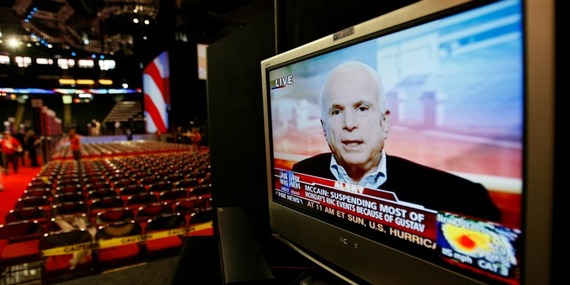Can John McCain Break Up the Cable Bundle Forever? (No, Probably Not)
A la carte television sounds wonderful. But it's not happening. And it could be a big headache if it did.
If you love television, you probably hate the television bundle. And if you hate the television bundle, your favorite person in Washington today is Sen. John McCain. His new legislation, introduced this afternoon, would pressure pay TV operators (i.e.: what you'd call "cable companies") to offer channels on an a la carte basis.
What's not to like about this law? You pay for the channels you want. You don't pay for the channels you don't want. Even the name -- "Television Consumer Freedom Act of 2013" -- is full of utterly unobjectionable words and sounds pretty perfect.
McCain's proposal comes at a rocky time for cable companies. Time Warner Cable and Comcast recently announced shrinking subscriber numbers. Their growing revenue comes mostly from higher cable costs among paying households. Meanwhile, Netflix and Hulu are setting new customer records each quarter. Tensions between media companies (who sell their networks in bundles to cable companies) and cable companies (who sell those network bundles in a megabundle to you, the TV-box owner) are boiling over in a lawsuit between Cablevision and Viacom.
This would appear the perfect occasion for Washington to ride in and slash the Gordian Knot of cable once and for all. But there's a catch -- actually, there are three catches.
First catch: Plausibility. McCain has proposed an a la carte TV plan before, and it was rejected even when he had more friends at the FCC who were vocally supportive of choose-your-own TV in 2006. So temper your optimism.
Second catch: Cost. Most independent studies have found that un-bundling the networks would dramatically raise the price of each individual channel because the networks would have to replace the money lost from being a part of the bundle. "A la carte" is not a synonym here for "vastly cheaper."
Why's that? Your bundle pays each channel in two ways. First, it pays directly. For example, ESPN "costs" about $5 a month; that is, about $5 from every cable bill goes to ESPN. Second, the bundle pays indirectly through advertising. If ESPN is in fewer households (i.e.: only the households that pay directly for ESPN), they'll project less ad revenue. As a result, buying ESPN could cost as much as $20 a month as the company seeks to make up revenue in the interim. Even if you don't watch ESPN, you'll still have to pay more per channel that you do today because of the economics of bundling and the dual-revenue model for networks.
On the bright side for consumers, perhaps you could see the dissolution of the cable bundle squeezing networks and programming costs and show budgets, leading to a deceleration of overall TV costs. But if customers had to pay more than expected for individuals channels, it's hard to know if they would view these savings as a bargain or just a less-for-less exchange.
Third catch: Logistics. Let's talk about something really practical. How many times a year could you switch your channel line-up? Once a year? Four times a year? It's a serious question.
Let's say you don't want A&E on its own. Sounds sensible. Then a show like "Duck Dynasty," one of the biggest hits in cable history, debuts and suddenly you want A&E. 'Easy,' you say, 'I'll just subscribe to A&E for a few months and cancel after Duck Dynasty is over.' But that just won't do. Channels like AMC won't survive if a handful of people only sign up for the few weeks that 'Mad Men' is airing. A la carte sounds like a pain-free option, but 100 million households adding and dropping channels mid-year is a recipe for a logistical and strategic disaster for the industry.
The television business is changing already. But the change is mostly additive. SNL Kagan estimated that pay-TV subs grew through 2012, even as Netflix and Hulu had historic years. TV might get smaller and more customizable sometime in the near future. But in the nearest future, the total TV megabundle -- cable + Netflix + Hulu Plus etc. -- is just getting bigger, and McCain's plan, which would introduce headaches for consumers and providers alike, probably isn't going to have a shot at changing anything.
><
